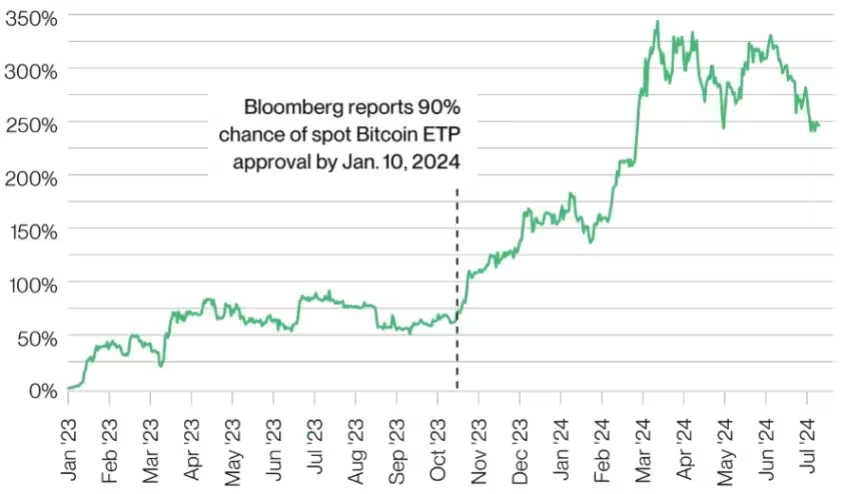As the highly anticipated launch date of spot Ethereum ETFs approaches, Matt Hougan, Chief Investment Officer of crypto asset manager Bitwise, has stressed the potential for these ETF inflows to drive the Ethereum price to record highs.
In a recent client note, Hougan highlighted the significant impact that ETF flows could have on the Ethereum price, surpassing even the effects witnessed in the spot Bitcoin ETF market in the US.
Ethereum ETFs Poised To Surpass Bitcoin’s Impact?
Hougan confidently predicts that introducing spot Ethereum ETFs will lead to a surge in ETH’s value, possibly reaching all-time highs above $5,000. However, he cautions that the first few weeks after the ETF launch could be volatile, as funds could flow out of the existing $11 billion Grayscale Ethereum Trust (ETHE) after it is converted to an ETF.
This could be similar to the case of the Grayscale Bitcoin Trust (GBTC), which saw significant outflows of over $17 billion after the Bitcoin ETF market was approved in January, with the first inflows recorded 5 months later on May 3.
Still, Hougan expects the market to stabilize in the long term, pushing Ethereum to record prices by the end of the year after the initial outflows subside, drawing a comparison with Bitcoin in key metrics to understand this thesis.
Related Reading
For example, Bitcoin ETFs have purchased more than twice the amount of Bitcoin compared to what miners have produced over the same period, contributing to a 25% increase in Bitcoin’s price since the ETF launch and a 110% increase since the market began pricing in the launch in October 2023.
That said, Hougan believes the impact on Ethereum could be even more significant, and identifies three structural reasons why Ethereum’s ETF inflows could have a greater impact than Bitcoin’s.
Lower Inflation, Staking Advantage, And Scarcity
The first reason Bitwise’s CIO highlights is Ethereum’s lower short-term inflation rate. While Bitcoin’s inflation rate was 1.7% when Bitcoin ETFs launched, Ethereum’s inflation rate over the past year has been 0%.
The second reason lies in the difference between Bitcoin miners and Ethereum stakers. Due to the expenses associated with mining, Bitcoin miners generally sell much of the Bitcoin they acquire to cover operational costs.
In contrast, Ethereum relies on a proof-of-stake (PoS) system, where users…
Click Here to Read the Full Original Article at NewsBTC…
























